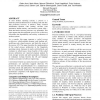Free Online Productivity Tools
i2Speak
i2Symbol
i2OCR
iTex2Img
iWeb2Print
iWeb2Shot
i2Type
iPdf2Split
iPdf2Merge
i2Bopomofo
i2Arabic
i2Style
i2Image
i2PDF
iLatex2Rtf
Sci2ools
EUROSYS
2007
ACM
2007
ACM
Sealing OS processes to improve dependability and safety
In most modern operating systems, a process is a -protected abstraction for isolating code and data. This protection, however, is selective. Many common mechanisms—dynamic code loading, run-time code generation, shared memory, and intrusive system APIs— make the barrier between processes very permeable. This paper argues that this traditional open process architecture exacerbates the dependability and security weaknesses of modern systems. As a remedy, this paper proposes a sealed process architecture, which prohibits dynamic code loading, selfmodifying code, shared memory, and limits the scope of the process API. This paper describes the implementation of the sealed process architecture in the Singularity operating system, discusses its merits and drawbacks, and evaluates its effectiveness. Some benefits of this sealed process architecture are: improved program analysis by tools, stronger security and safety guarantees, elimination of redundant overlaps between the OS and languag...
EUROSYS 2007 | Open Process Architecture | Sealed Process Architecture | Software Isolated Process | System Software |
| Added | 10 Mar 2010 |
| Updated | 10 Mar 2010 |
| Type | Conference |
| Year | 2007 |
| Where | EUROSYS |
| Authors | Galen C. Hunt, Mark Aiken, Manuel Fähndrich, Chris Hawblitzel, Orion Hodson, James R. Larus, Steven Levi, Bjarne Steensgaard, David Tarditi, Ted Wobber |
Comments (0)

